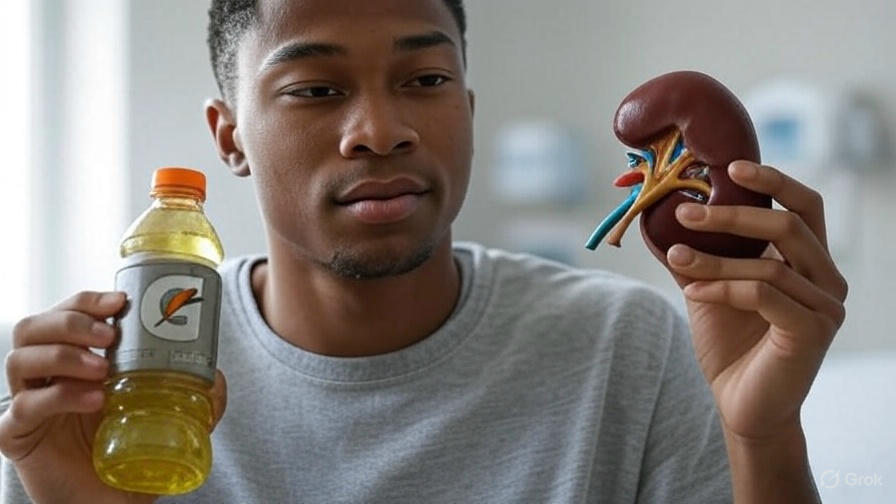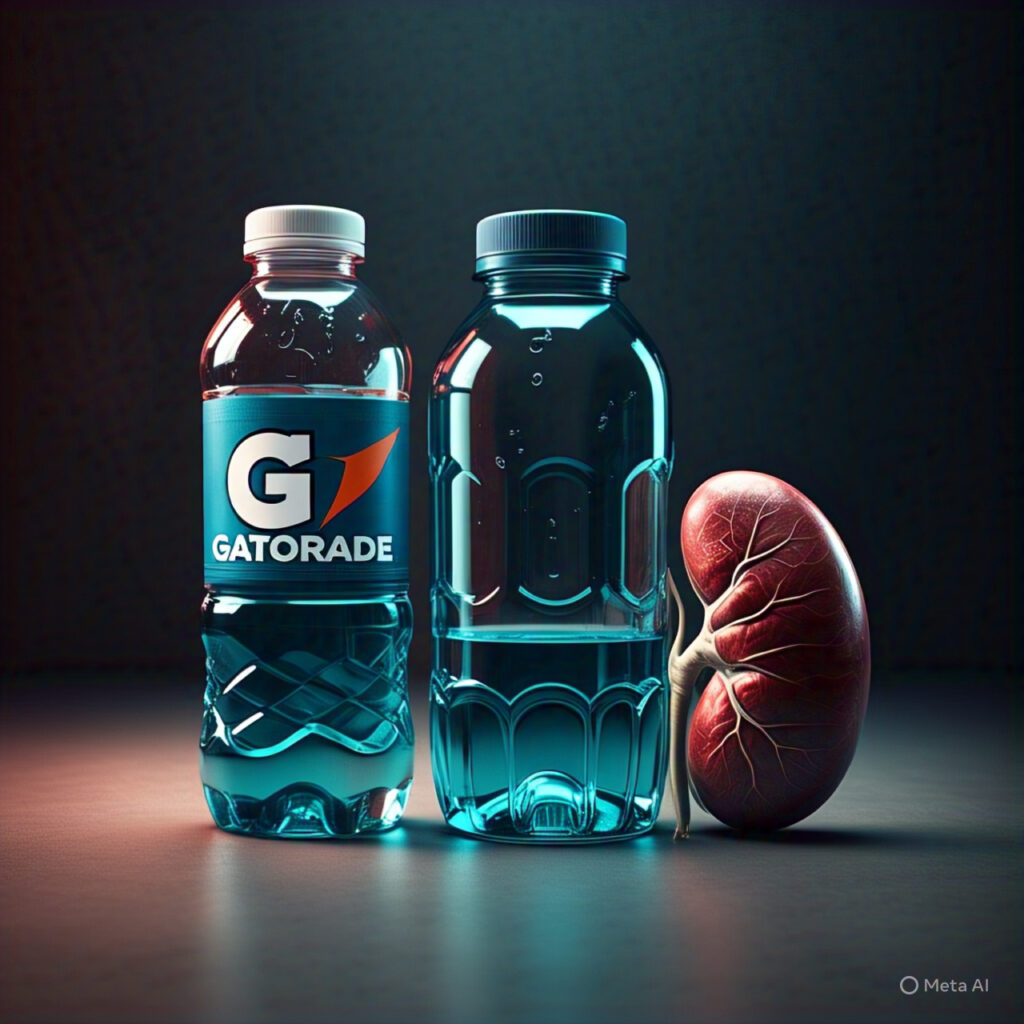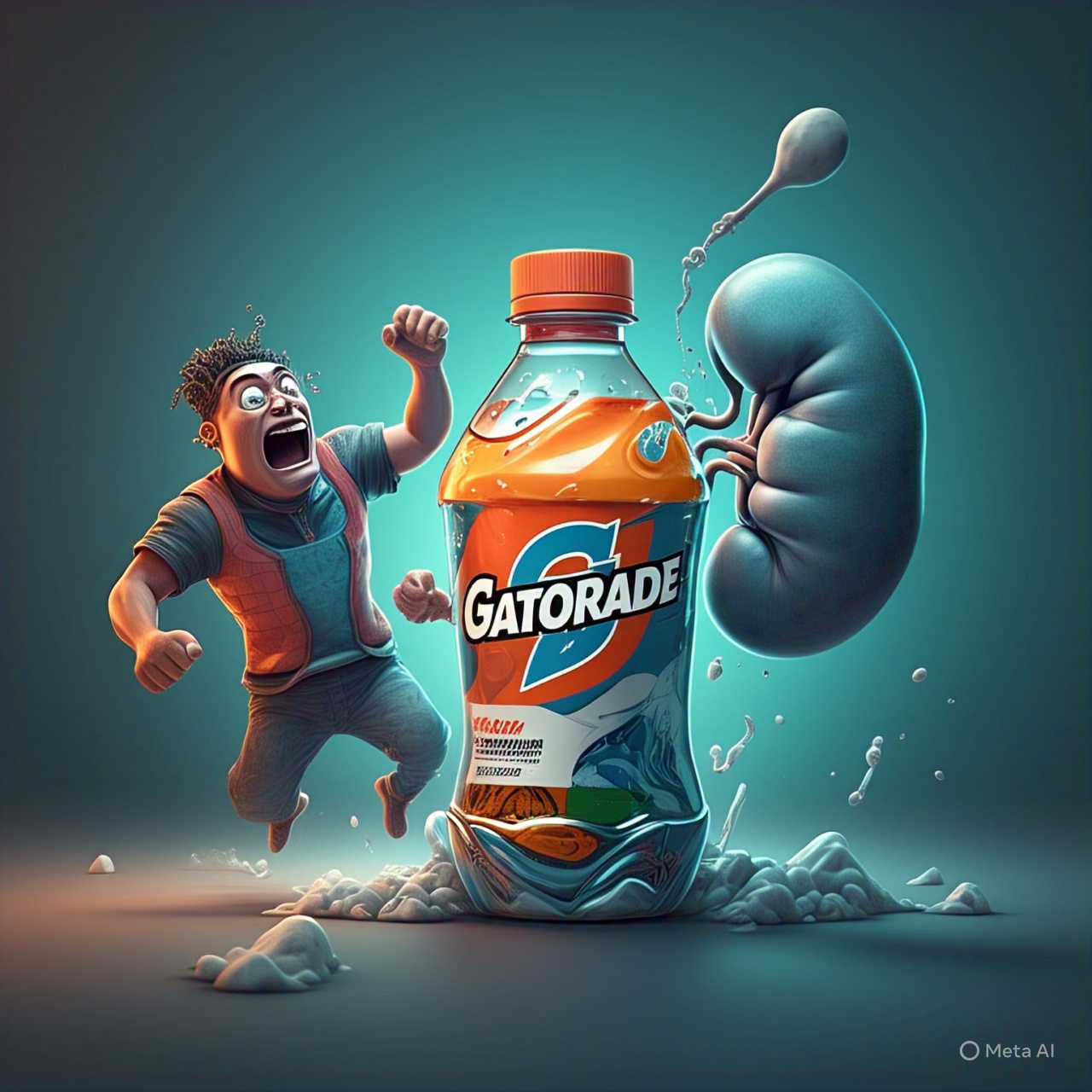Does Gatorade Cause Kidney Stones?
Gatorade does not directly cause kidney stones. However, it’s not the best choice for preventing them.
Research Findings
Studies show that Gatorade “had no effect on stone formation” and does not raise urinary stone risk factors. Here are some key points from the research:
- Gatorade increased urinary sodium and chloride.
- These changes were normal.
- They were not clinically significant.
Expert Advice
Nutrition experts recommend that “although hydration is very important, Gatorade may not be the best way to stay hydrated to prevent kidney stones.” This is partly due to its high sodium and sugar content. The added sodium could contribute to stone formation in some people, but research shows this effect isn’t significant for most.
Best Hydration Option
For preventing kidney stones, plain water is the best option for hydration. Gatorade is more suitable for intense athletic activities that require electrolyte replacement.

Understanding Gatorade and Urinary Health
Urinary Issues and Gatorade
Gatorade usually does not cause serious urinary issues for most people when consumed in normal amounts. Studies show it may raise urinary sodium and chloride levels compared to water. However, these changes stay within normal limits and are not clinically significant.
Sugar Content and Bladder Sensitivity
Some Gatorade varieties have high sugar levels. This could irritate the bladder in sensitive individuals or worsen symptoms for those with urinary tract infections. While there’s no direct evidence linking Gatorade to UTIs, the high sugar content may be a concern during active infections.
Drinks to Avoid During UTIs:
- Gatorade (high sugar)
- Sugary sodas
- Fruit juices with added sugar
Electrolytes and Water Retention
The electrolytes in Gatorade help the body retain water through osmosis. This usually leads to less frequent urination compared to plain water. For those with kidney stones, research shows that Gatorade doesn’t significantly raise the risk factors for stone formation. However, individual responses can vary based on personal health and consumption habits.
Preventing Kidney Stones: The Best Drinks

The best drink to prevent kidney stones is plain water. Staying well-hydrated helps dilute stone-forming substances in urine. Aim for at least 12 glasses daily.
Helpful Citrus Juices
Citrus juices, especially lemon juice, are also very helpful. They contain natural citrate, which can reduce or block stone formation. Just three ounces of lemon juice daily can prevent calcium oxalate stones, the most common type.
You can mix lemon juice concentrate with water for convenience. Fresh lemons and bottled lemon juice work just as well. Other citrus juices, like orange and grapefruit, also offer protective citrate compounds. These bind with calcium and prevent crystal formation.
Other Beneficial Drinks
- Low-fat milk
- Calcium-rich drinks
These help reduce oxalate absorption and lower stone risk, contrary to common beliefs.
The Benefits of Lemon Juice for Kidney Stone Prevention
The idea that lemon juice prevents kidney stones is not a myth, but it is more complex than often suggested. Research shows that drinking just 4 ounces of lemon juice daily raises urine citrate levels without increasing oxalate levels. Citrate helps prevent calcium oxalate stones by binding calcium and stopping crystal formation.
Clinical Trials and Challenges
Clinical trials show that fresh lemon juice can help prevent stone recurrence. However, the effect lessens as patients struggle to stick to the regimen. This is mainly due to:
- The sour taste
- Practical issues with consumption
Many kidney stone patients found it hard to drink 120 milliliters of lemon juice daily. Also, consuming large amounts of lemonade can lead to dental problems due to its acidity.
Conclusion
While lemon juice offers real benefits for kidney stone prevention through citrate, it is not a miracle cure. Medical citrate supplements are often more effective and practical than trying to drink lots of lemon juice each day.
The Impact of Electrolyte Supplements on Kidney Stones
Electrolyte supplements can affect kidney stones in different ways. This depends on the type and amount taken. Most people don’t need these supplements unless they are athletes.
The Risks of High Sodium
High sodium levels can be harmful, especially for those prone to kidney stones. Too much sodium increases calcium in urine, which raises the risk of stones.
Helpful Electrolyte Supplements
On the other hand, some electrolyte supplements can help prevent kidney stones. For example:
- Magnesium can stop crystal formation, which reduces the risk of stones by binding to oxalate in the gut and urine.
- Potassium-magnesium citrate is also effective. It can lower the chance of calcium oxalate stones by 85% when taken for up to three years.
Choosing the Right Supplement
Choosing the right supplement is crucial. Citrate forms of potassium and magnesium help prevent stones, while high-sodium products can increase risk.
For most people, drinking enough plain water is key to preventing kidney stones. Targeted electrolyte supplements should only be used under medical advice for those with specific stone types or risk factors.
Understanding the Risks of Liquid IV
There’s no direct proof that Liquid IV causes kidney stones in everyone. However, it might lead to stones in some people. This risk comes from its high sodium, added sugar, and vitamin C content.
Nutritional Breakdown
Each packet contains:
- 510 mg of sodium
- 11 grams of added sugar
These nutrients can raise kidney stone risk, especially since many people already eat too much sodium.
Expert Warnings
While experts haven’t linked Liquid IV directly to kidney stones, they warn that drinks with added sodium can increase risk. The high salt content is a concern for those prone to stones.
Recommendations
Liquid IV is generally safe for most when used as directed. However, if you have a history of kidney stones or are at higher risk, consider these steps:
- Talk to your healthcare provider before using it regularly.- For everyday hydration, plain water is the safest choice.- Reserve Liquid IV for quick rehydration or electrolyte replacement.
If you want to Know more about Kidney Stone and how to tackle them in future you can visit our website https://medlifeguide.com

